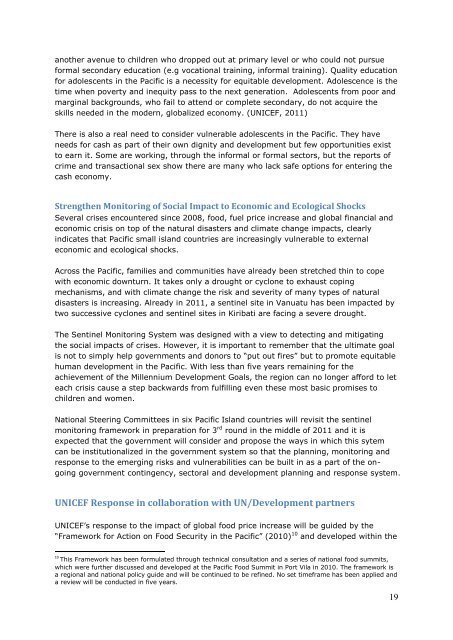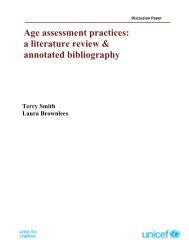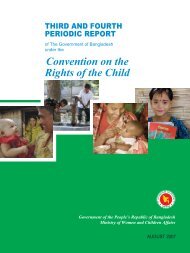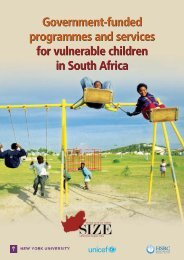Food Price Increases in the Pacific Islands - Unicef
Food Price Increases in the Pacific Islands - Unicef
Food Price Increases in the Pacific Islands - Unicef
You also want an ePaper? Increase the reach of your titles
YUMPU automatically turns print PDFs into web optimized ePapers that Google loves.
ano<strong>the</strong>r avenue to children who dropped out at primary level or who could not pursue<br />
formal secondary education (e.g vocational tra<strong>in</strong><strong>in</strong>g, <strong>in</strong>formal tra<strong>in</strong><strong>in</strong>g). Quality education<br />
for adolescents <strong>in</strong> <strong>the</strong> <strong>Pacific</strong> is a necessity for equitable development. Adolescence is <strong>the</strong><br />
time when poverty and <strong>in</strong>equity pass to <strong>the</strong> next generation. Adolescents from poor and<br />
marg<strong>in</strong>al backgrounds, who fail to attend or complete secondary, do not acquire <strong>the</strong><br />
skills needed <strong>in</strong> <strong>the</strong> modern, globalized economy. (UNICEF, 2011)<br />
There is also a real need to consider vulnerable adolescents <strong>in</strong> <strong>the</strong> <strong>Pacific</strong>. They have<br />
needs for cash as part of <strong>the</strong>ir own dignity and development but few opportunities exist<br />
to earn it. Some are work<strong>in</strong>g, through <strong>the</strong> <strong>in</strong>formal or formal sectors, but <strong>the</strong> reports of<br />
crime and transactional sex show <strong>the</strong>re are many who lack safe options for enter<strong>in</strong>g <strong>the</strong><br />
cash economy.<br />
Streng<strong>the</strong>n Monitor<strong>in</strong>g of Social Impact to Economic and Ecological Shocks<br />
Several crises encountered s<strong>in</strong>ce 2008, food, fuel price <strong>in</strong>crease and global f<strong>in</strong>ancial and<br />
economic crisis on top of <strong>the</strong> natural disasters and climate change impacts, clearly<br />
<strong>in</strong>dicates that <strong>Pacific</strong> small island countries are <strong>in</strong>creas<strong>in</strong>gly vulnerable to external<br />
economic and ecological shocks.<br />
Across <strong>the</strong> <strong>Pacific</strong>, families and communities have already been stretched th<strong>in</strong> to cope<br />
with economic downturn. It takes only a drought or cyclone to exhaust cop<strong>in</strong>g<br />
mechanisms, and with climate change <strong>the</strong> risk and severity of many types of natural<br />
disasters is <strong>in</strong>creas<strong>in</strong>g. Already <strong>in</strong> 2011, a sent<strong>in</strong>el site <strong>in</strong> Vanuatu has been impacted by<br />
two successive cyclones and sent<strong>in</strong>el sites <strong>in</strong> Kiribati are fac<strong>in</strong>g a severe drought.<br />
The Sent<strong>in</strong>el Monitor<strong>in</strong>g System was designed with a view to detect<strong>in</strong>g and mitigat<strong>in</strong>g<br />
<strong>the</strong> social impacts of crises. However, it is important to remember that <strong>the</strong> ultimate goal<br />
is not to simply help governments and donors to “put out fires” but to promote equitable<br />
human development <strong>in</strong> <strong>the</strong> <strong>Pacific</strong>. With less than five years rema<strong>in</strong><strong>in</strong>g for <strong>the</strong><br />
achievement of <strong>the</strong> Millennium Development Goals, <strong>the</strong> region can no longer afford to let<br />
each crisis cause a step backwards from fulfill<strong>in</strong>g even <strong>the</strong>se most basic promises to<br />
children and women.<br />
National Steer<strong>in</strong>g Committees <strong>in</strong> six <strong>Pacific</strong> Island countries will revisit <strong>the</strong> sent<strong>in</strong>el<br />
monitor<strong>in</strong>g framework <strong>in</strong> preparation for 3 rd round <strong>in</strong> <strong>the</strong> middle of 2011 and it is<br />
expected that <strong>the</strong> government will consider and propose <strong>the</strong> ways <strong>in</strong> which this sytem<br />
can be <strong>in</strong>stitutionalized <strong>in</strong> <strong>the</strong> government system so that <strong>the</strong> plann<strong>in</strong>g, monitor<strong>in</strong>g and<br />
response to <strong>the</strong> emerg<strong>in</strong>g risks and vulnerabilities can be built <strong>in</strong> as a part of <strong>the</strong> ongo<strong>in</strong>g<br />
government cont<strong>in</strong>gency, sectoral and development plann<strong>in</strong>g and response system.<br />
UNICEF Response <strong>in</strong> collaboration with UN/Development partners<br />
UNICEF‟s response to <strong>the</strong> impact of global food price <strong>in</strong>crease will be guided by <strong>the</strong><br />
“Framework for Action on <strong>Food</strong> Security <strong>in</strong> <strong>the</strong> <strong>Pacific</strong>” (2010) 10 and developed with<strong>in</strong> <strong>the</strong><br />
10 This Framework has been formulated through technical consultation and a series of national food summits,<br />
which were fur<strong>the</strong>r discussed and developed at <strong>the</strong> <strong>Pacific</strong> <strong>Food</strong> Summit <strong>in</strong> Port Vila <strong>in</strong> 2010. The framework is<br />
a regional and national policy guide and will be cont<strong>in</strong>ued to be ref<strong>in</strong>ed. No set timeframe has been applied and<br />
a review will be conducted <strong>in</strong> five years.<br />
19

















